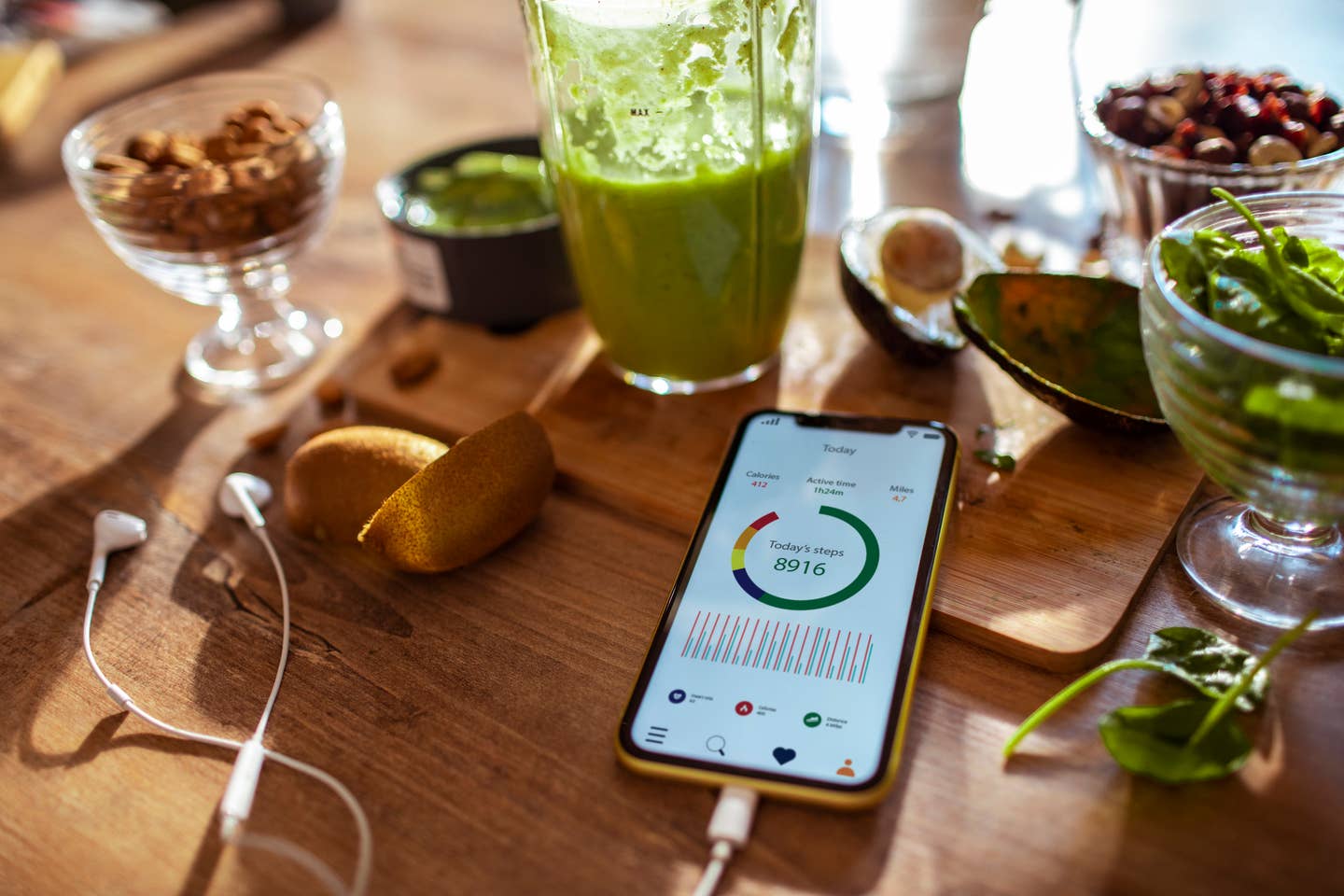
Study: Intermittent Fasting Works to Lose Weight and Slow the Aging Process
The newest diet trend, Intermittent Fasting, is enjoying a surge in popularity because unlike keto, it's simple and natural and it works by tapping into your body's own ability to burn fat, just by spacing out your eating times. Now there's proof that intermittent fasting also helps cells repair themselves, and slow down the aging process, according to the latest research.
How it works: Intermittent fasting helps your body rid itself of toxins and do the necessary repair work on a cellular level that helps you stay healthy and fight off infections as well as slow down the aging process, according to Alicia Galvin, an RD who helps her clients use IF to lose weight effectively. "Fasting lets the mitochondria repair themselves, which means your cells actually age less when you are not eating, since it allows them to do other things, like get rid of toxins and repair damaged DNA," she explains.
The key, she adds, is to eat healthy plant-based foods when you break the fast and all during the hours when you are eating. "IF is not an excuse to eat a bunch of junk food," she adds, "since doing so will undermine all the good work you've achieved during the fasting period, so if you choose sweets or calorie-dense foods, you may not lose weight while intermittent fasting, and you could even gain it, depending on how much sugary food you allow yourself when you break your fast."
How Intermittent Fasting Works, by an RD
Intermittent fasting is simple: You simply set aside hours when you don't eat for a stretch of time (usually start with 12 hours then stretch it to 14 or 16 or even 18 hours) and allow the body to activate its fat stores and burn energy from those for fuel, once you run out of the glycogen stores in your muscles, liver, and organs. When you fast for a length of time, your body switches over to burn fat. But you don't only lose weight, research shows, you also allow your body to flush out toxins and repair itself on a cellular level, fighting off aging.
Intermittent fasting is the second most popular diet of 2020, according to how many people are searching the term (the first most popular is keto, but keto is not for everyone, since it requires following an extremely low-carb diet, which is so highly restrictive it's almost impossible to sustain). Intermittent fasting, by contract, is easy to do, since it simply requires you to skip eating for about 14 hours at a clip, which according to research by Dr. Jason Fung, author of Life in the Fasting Lane, your body will send hunger signals during the times when you normally would have a meal, such as breakfast or lunch, but then those signals subside when your body "feeds itself" by dipping into your fat stores for ready energy.
Intermittent fasting is popular because it's so easy and it works. And they think you can eat aby essentially waiting between meals to eat. Whether you prefer to skip dinner and go 16 to18 hours without food from lunch (at 1 p.m., say) to the following day's breakfast (at 8 am, for instance) or you choose to push off eating first thing when you wake up (as is the choice for most people who use Intermittent Fasting) and don't eat again until 1 or 2 in the afternoon (achieving that 14-hour window including the 8 overnight hours, while you sleep).
The Other Benefit to Intermittent Fasting is Slowing Down the Aging Process
studies have shown that the most important thing about fasting is the cellular benefits that you gain by giving your body a break. Galvin says this starts with the cell's mitochondria, the part of your cells that convert food into energy. These have their own DNA which can get overwhelmed when we eat too much, but fasting allows them a chance to repair, which slows aging on a cellular level. According to one important study, too much body fat can also overwhelm the mitochondria and speed up aging. Whereas fasting has the reverse effect.
"A large body of evidence suggests that persistent dietary fat overload causes mitochondrial dysfunction and systemic metabolic gridlock," the study authors found. "Mitochondrial and lipid metabolism ... are severely affected upon persistent high-fat diet (HFD) leading to premature tissue aging. Here, we designed weekly cycles of fasting (called as time-controlled fasting, TCF) and showed that they were effective in limiting mitochondrial damage and metabolic disturbances induced by HFD."
So no matter what you eat, fasting can help your cells recover and repair, the study found. But to lose weight, Galvin suggests that the best way to make the most of your fasting is to keep your blood sugar stabilized and your diet healthy. "So if someone is eating too many high carb foods and not enough fat or protein, you can have blood sugar spike," she explains, which signals the body to store fat, undoing all your best intentions.
"So I make sure clients are incorporating healthy fats, like nuts and seeds and high-fiber foods, such as lentils and vegetables, when they break their fast. That way they are not getting hyperglycemic episodes." The best way to use fasting for weight loss is to stabilize your blood sugar and you do that by making sure you are not eating too high-glycemic foods. You could undermine your efforts to lose weight if you're not careful during the on hours."
What to Eat When You Are Intermittent Fasting, For Best Results for Weight Loss
So what is the best meal to eat after you finish your Intermittent Fasting period? A big green salad, with lots of vegetables and a little olive oil dressing. You can add beans or lentils or chickpeas which are high in fiber and protein. You do want a little bit of plant-based protein and fiber as well as healthy carbs in your first meal after you finish fasting."
Intermittent Fasting works by burning fat, but it is not a license to go crazy during the eight hours of eating. You are just going to counteract all of what you have done, she adds.
Intermittent Fasting Lets Cells Repair, Helps Avoid Disease, and Slows Down Aging
"When you intermittent fast, you are actually giving your body and your cells a chance to recover from stresses and toxins. Your cells' mitochondria get to repair, which leads to healthier cells and disease prevention," Galvin explains. "And letting your body repair itself is really great for brain health as well," she adds. Studies have shown that fasting can reduce the age-related cognitive decline in the lab, but so far these studies have been on mice. As for the aging process, fasting has caused excitement because DNA gets damaged in two ways: through genetics and through behavior. the behavioral kind is what's helped by fasting.
Mitochondria in the cells help convert the food we eat to energy, but when it gets damaged it's prone to mutations, according to recent research. "Because mitochondrial DNA has a limited ability to repair itself when it is damaged, these mutations tend to build up over time," according to a study published in Genetics Home Research, part of MedlinePlus.
"A buildup of somatic mutations in mitochondrial DNA has been associated with some forms of cancer and an increased risk of certain age-related disorders such as heart disease, Alzheimer's disease, and Parkinson's," the study found. "Additionally, research suggests that the progressive accumulation of these mutations over a person’s lifetime may play a role in the normal process of aging. So according to the studies, allowing your body to fast is a way to lower your risk of disease and to slow down the aging process.
To Fight Aging and to Keep Weight Off, Avoid Foods That Spike Blood Sugar
Bottom line: When you eat foods that spike blood sugar it also leads to your body to store fat instead of burning it off, Galvin adds, So this ends up in undermining the whole point of fasting. To lose weight and dial back the aging process, choose a diet that is mostly plant-based, high in fiber-rich foods like vegetables, fruit, nuts, seeds, and legumes like lentils and peas. If you stop eating after an early dinner and go 14 hours of fasting, break your fast with a big salad full of the healthiest plant-based foods you can find. Then stay off the junk food for the best results.
More From The Beet






